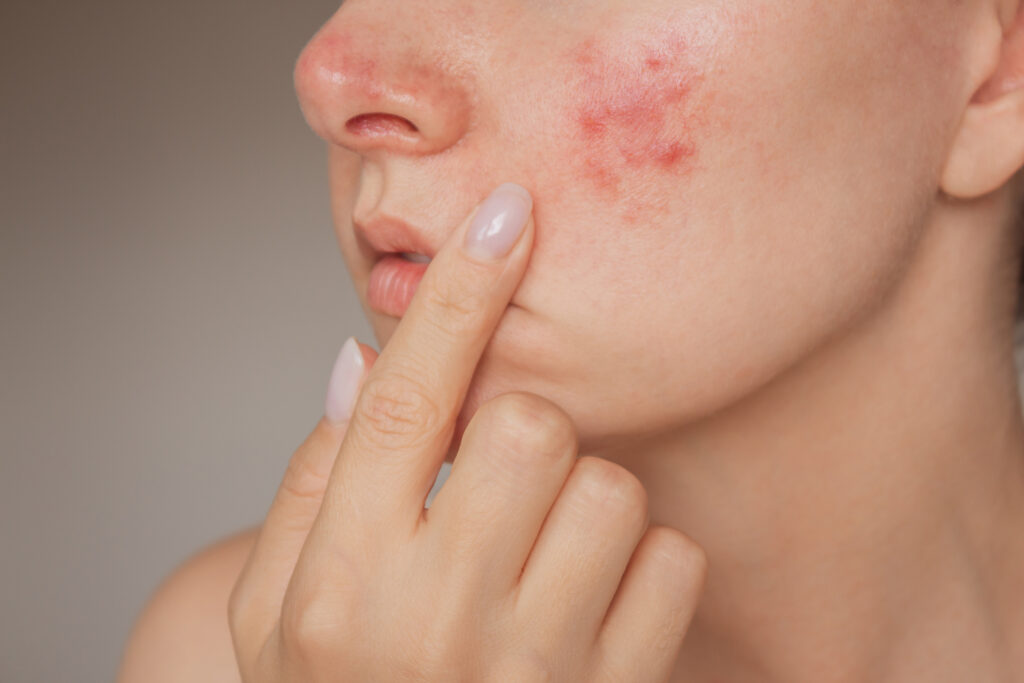Acne: Types, Causes, Symptoms, and Effective Treatments
Acne is one of the most common skin concerns affecting people of all ages—from teenagers experiencing hormonal changes to adults dealing with persistent breakouts. While it’s often seen as a cosmetic issue, acne can significantly impact self-esteem and quality of life.
In this guide, we’ll break down everything you need to know about acne: what causes it, the different types, how it presents, and the most effective treatment options available today.
What is Acne?
Acne is a skin condition that occurs when hair follicles become clogged with oil (sebum) and dead skin cells. This leads to the development of blackheads, whiteheads, pimples, or deeper lumps (cysts or nodules). Acne most often appears on the face, chest, back, and shoulders, where sebaceous (oil) glands are most active. It can range from occasional breakouts to severe, long-term inflammatory conditions.

What Causes Acne?
There are several factors that contribute to the development of acne:
- Excess oil production
- Clogged hair follicles
- Bacterial overgrowth (Cutibacterium acnes)
- Hormonal changes (especially androgens)
- Genetics
- Certain medications or cosmetics
- Diet (some studies link dairy and high glycemic foods to acne)
- Stress, which may worsen existing breakouts
What are the Types of Acne?
Acne can present in a variety of forms, which are typically categorised as non-inflammatory or inflammatory:
1. Non-inflammatory Acne
- Whiteheads (Closed Comedones): Small bumps under the skin’s surface caused by trapped oil and dead skin.
- Blackheads (Open Comedones): Clogged pores that are open to the air, where the surface darkens due to oxidation—not dirt.
2. Inflammatory Acne
- Papules: Small, red, tender bumps without visible pus.
- Pustules: Like papules but contain white or yellow pus at the tip.
- Nodules: Large, painful lumps deep under the skin, often hard to the touch.
- Cysts: Deep, pus-filled lesions that can lead to scarring; considered the most severe form.
What are the symptoms of Acne?
While symptoms vary based on acne type and severity, common signs include:
- Oily skin
- Redness and swelling
- Tender or painful bumps
- Pus-filled lesions
- Scarring (in more severe cases)
- Dark spots (post-inflammatory hyperpigmentation)
Who Gets Acne?
Acne affects nearly everyone at some point, but it’s especially common in:
- Teenagers (due to puberty and hormone changes)
- Women (particularly during menstruation, pregnancy, or PCOS)
- Adults in their 20s–40s experiencing adult-onset acne
- People with oily skin or a family history of acne
What are the Effective Acne Treatments?
Acne treatment depends on the type and severity of breakouts. Here’s a breakdown of the most common and effective options:
1. Topical Treatments
- Benzoyl Peroxide: Kills bacteria and reduces inflammation.
- Salicylic Acid: Unclogs pores and exfoliates dead skin cells.
- Retinoids (e.g., Tretinoin, Adapalene): Promote cell turnover and prevent pore clogging.
- Topical Antibiotics: Reduce bacteria and inflammation (often combined with benzoyl peroxide).
2. Professional Procedures
- Chemical Peels: Help unclog pores, reduce acne scars and pigmentation.
- Laser and Light Therapy: Targets bacteria and reduces oil production.
- Extraction Treatments: Safely remove blackheads and whiteheads.
- Microneedling or RF Microneedling: Improves acne scarring and skin texture.
3. Lifestyle and Skincare Changes
- Use non-comedogenic skincare and makeup products
- Cleanse gently twice daily—avoid over-washing
- Avoid touching or picking acne lesions
- Keep hair and pillowcases clean
- Manage stress with mindfulness or exercise
When to See a Dermatologist
You should consider professional help if:
- Over-the-counter treatments aren’t working after 8–12 weeks
- You experience painful, deep cystic acne
- You’re developing scars or dark marks
- Acne is affecting your confidence or mental health
Final Thoughts
You don’t need to live with acne. Whether you’re seeking medical solutions, cosmetic improvements, or simply better guidance on your skincare routine, The Devonshire Clinic is here to support your journey to clearer, healthier skin. Book your consultation today and start your personalised acne treatment plan with London’s trusted skin specialists.